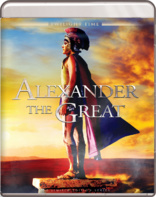Alexander the Great Blu-ray Movie
HomeAlexander the Great Blu-ray Movie 
Limited Edition to 3000Twilight Time | 1956 | 136 min | Not rated | Mar 15, 2016
Movie rating
6.1 | / 10 |
Blu-ray rating
| Users | 3.8 | |
| Reviewer | 2.5 | |
| Overall | 3.1 |
Overview
Alexander the Great (1956)
Fierce military commander, magnificent warrior, world conqueror. Legendary Macedonian hero Alexander the Great is celebrated in this definitive film about his tumultuous life. Richard Burton, Fredric March and Claire Bloom lead a remarkable cast of thousands in this epic film that seamlessly blends spectacular action, vivid character portrayals and an age-old tale of wisdom, blood and glory! Alexander (Burton) is a man torn by conflict between the lofty wisdom of his teacher, Aristotle (Barry Jones), loyalty to his warrior father (March) and his own grand design for world domination. In a turbulent world of political unrest, this ambitious young man must rise above all conflict to unite the continents of Europe and Asia...and become one of the most celebrated rulers of all time!
Starring: Richard Burton, Fredric March, Claire Bloom, Danielle Darrieux, Peter CushingDirector: Robert Rossen
| History | Uncertain |
| War | Uncertain |
| Drama | Uncertain |
| Biography | Uncertain |
Specifications
Video
Video codec: MPEG-4 AVC
Video resolution: 1080p
Aspect ratio: 2.34:1
Original aspect ratio: 2.55:1
Audio
English: DTS-HD Master Audio 2.0 (48kHz, 24-bit)
Music: DTS-HD Master Audio 2.0
Subtitles
English SDH
Discs
50GB Blu-ray Disc
Single disc (1 BD)
Playback
Region free
Review
Rating summary
| Movie | 2.5 | |
| Video | 3.5 | |
| Audio | 3.5 | |
| Extras | 2.0 | |
| Overall | 2.5 |
Alexander the Great Blu-ray Movie Review
All the men's king.
Reviewed by Jeffrey Kauffman April 2, 2016Maybe Robert Rossen should have taken a page out of the Oliver Stone playbook. Stone has famously revisited his biographical film of Alexander the Great multiple times, leading to an almost comical number of various home video releases, including Alexander, Alexander Revisited and Alexander, The Ultimate Cut. Despite the many revisions Stone made to his film, though, a lot of viewers were still left with a less than rapturous response to it, and so perhaps it was wise of Rossen to leave well (and/or bad) enough alone with his 1956 opus Alexander the Great, a pretty stultifying affair that has its own share of problems to deal with which are just as pronounced as the issues with Stone’s film(s), but in a completely different way. Rossen, the very definition of a left leaning rabble rouser (he was a proud member of the American Communist Party, appeared before the House Un-American Activities Committee, and was briefly blacklisted before naming names), had achieved a career high in 1949 with All the King's Men, a film which garnered Rossen an Oscar for Best Picture (along with additional nominations for Best Adapted Screenplay and Best Director), as well as bestowing statuettes on Broderick Crawford for Best Actor and Mercedes McCambridge for Best Supporting Actress. Shortly after this pinnacle, though, the whole “red scare” phenomenon reared its ugly head, leaving Rossen’s career in a temporary shambles, despite his ultimate decision to (more or less) cooperate with the congressional authorities. Rossen seemed to stumble a bit professionally, probably understandably, after this turn of events, and his early to mid-fifties output was haphazard at best, including The Brave Bulls (made just as the HUAC drama was unfolding which ultimately led to the dissolution of Rossen’s contract with Columbia) and Mambo, neither of which had anything approaching the impact (either critically or with the general ticket buying populace) that some of his earlier work had. Rossen evidently had high hopes that Alexander the Great would reestablish his reputation in the film industry, but the film comes off as a well meaning but awfully dry account of one of the most epochal personalities in history.
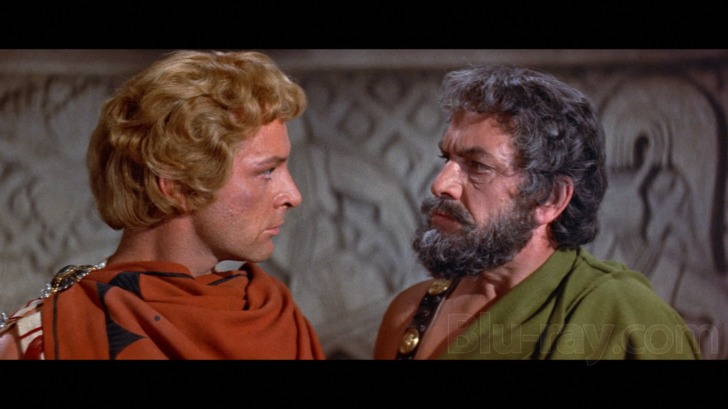
Stone’s conception of Alexander, at least in its original theatrical formulation, was a fairly straightforward affair, and one which offered a perspective, however intermittent, from a supposed cohort of the world conqueror, namely Ptolemy. Rossen provides no real “I was there” point of view to establish his frame of reference, instead offering the cinematic equivalent of an omniscient narrator in the form of his far reaching screenplay (that said, this film's Ptolemy shows up as a relatively late and brief narrator here as well). Perhaps one of Alexander the Great’s first stumbles is in its (understandable) emphasis on Alexander’s father, Philip (Frederic March), a decision made even wobblier due to the perhaps infelicitous casting of March in the role. While March has the requisite gravitas for such an iconic character, there’s something simply laughable about watching him tool around in his battle “kilt” with his fake looking black beard that immediately sets the film off into near camp territory.
While perhaps not at the devious levels of Angelina Jolie’s Olympias in the Stone film(s), Danielle Darrieux (billed as “the French star”, just in case American audiences weren’t sure whom she was) is nicely duplicitous as Alexander’s mother, and in some ways the Rossen film is a bit more convincing in terms of the marital discord in which Alexander was raised. In fact the whole melodramatic dysfunction of the family provides most of the drama for the film's first hour or so. In some ways, Rossen’s film is probably more overt in its formulation that Olympias’ insistence that Alexander is a child of the gods naturally leads Philip to assume she’s been unfaithful with him (after all, Leda’s little interaction with a certain swan may well have been a bedtime story back in the day). The first part of Alexander the Great gets the roiling family dynamics established fairly quickly and easily and then moves on to the young boy’s training regimen (much like the Stone version, in fact), though Richard Burton shows up as the supposedly teenaged Alexander rather early on.
A blonde tressed Burton is only slightly less anachronistic looking than the skirt wearing March, but Burton inhabits the role with typical bravado and even a certain amount of vulnerability once a few plot dynamics come into play. If the first half of the film takes its own sweet time in detailing Alexander’s less than happy home life, the second half finally starts offering his exploits as a world conqueror, albeit still playing out against the tug of war between Olympias and Philip, at least that is until Olympias’ scheming takes Philip out of the picture (literally and figuratively).
Where Stone spared no expense in offering epic battle scenes in his Alexander, Rossen, perhaps wanting to pinch his pennies a bit, tends to elide some of this activity with montages, something that probably further deprives Alexander the Great from ever feeling as “big” as it should. Rossen also hesitates, at least a bit, in providing a traditional romantic arc for the character, offering a “half breed” named Barsine (Claire Bloom) who is supposedly the missing link able to understand what Alexander means for both the Greeks and the Persians. This part of the film never really attains much impact, and indeed the film’s most moving moments tend to surround a number of deaths which accrue, moments which allow Burton to get beneath the steely surface of Alexander to explore something a little more nuanced. (The "real" romance here would seem to be the near incestuous relationship between Alexander and Olympias.)
I’ve commented in reviews of other films offering accounts of epochal historical figures that often they play like tableaux, pretty pictures with often awesomely epic vistas which nonetheless fail to really feel real in any overwhelming way. That’s definitely the case with Alexander the Great, despite some decent performances and Rossen’s often quite intelligently written screenplay. Considering the fact that two filmmakers as disparate as Rossen and Stone failed to “conquer” Alexander (cinematically at least), the world beater may simply be one character too big for even widescreen glory to properly capture.
Alexander the Great Blu-ray Movie, Video Quality 
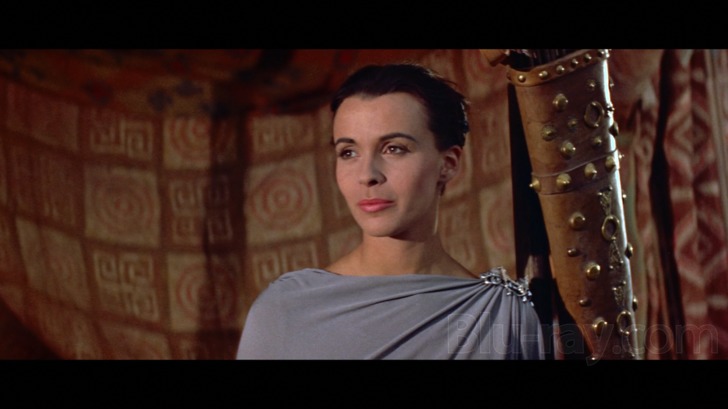
Alexander the Great is presented on Blu-ray with an AVC encoded 1080p transfer in 2.34:1. My home video history with this title goes back to VHS days (this release was offered in a "deluxe clamshell" that was impossible to shelve with the rest of my standard sized tapes). This high definition presentation is certainly heads and shoulders above that, as well as the subsequent DVD (as well it should be), but it still shows signs of aging. Elements are occasionally mottled with speckles or small scratches, and there are brief moments of instability (watch the superimposed text crawl at the very opening of the film). Colors are just slightly muted looking at times, with flesh tones tending toward a pinkish hue, but overall the palette is still rather robust looking, especially in the second half of the film. Clarity and sharpness are somewhat variable, due at least in part to Rossen's perpetual use of long sequences which offer a series of optical dissolves. Grain can spike appreciably in these moments, occasionally assuming a pretty chunky appearance. There's some pronounced anamorphic squeeze at the far edges of the frame, a remnant of the film's CinemaScope genesis. Watch shots where people are almost off "in the wings" (so to speak) and you'll notice that they're really skinny.
Alexander the Great Blu-ray Movie, Audio Quality 
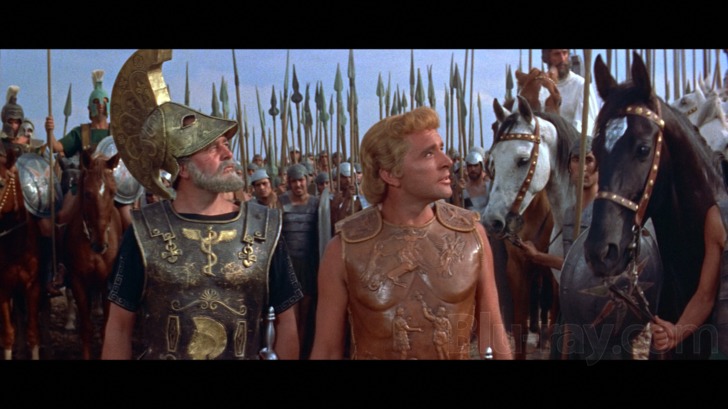
The IMDb lists Alexander the Great as having had a 4 track stereo presentation, at least at one point, but the Blu-ray offers only a DTS- HD Master Audio 2.0 track. That said, directionality is very much at play throughout the film, and while Mario Nascimbene's score can sound just a bit boxy at times, other sound effects, including elements like galloping horses or the clank of metal in battle scenes, resonate quite effectively. Dialogue is presented very cleanly and clearly and there is no damage of any import to warrant concern.
Alexander the Great Blu-ray Movie, Special Features and Extras 
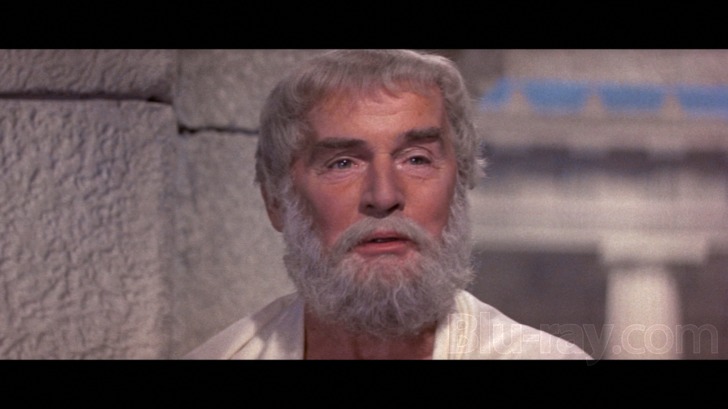
- Claire Bloom Talks About Alexander the Great (1080p; 17:26) finds the gracious actress talking about more than simply this particular film in this nice reminiscence.
- Original Theatrical Trailer (480p; 2:52)
- MGM 90th Anniversary Trailer (1080p; 2:06)
- Isolated Score Track is presented in DTS-HD Master Audio 2.0.
Alexander the Great Blu-ray Movie, Overall Score and Recommendation 
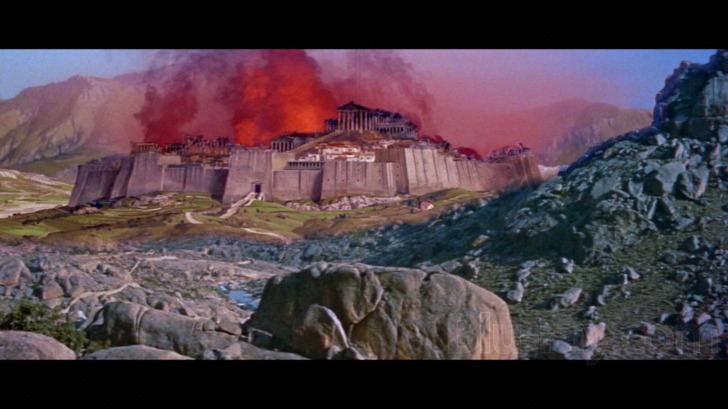
The pomp and circumstance of Alexander the Great may not attain the hyperbolic dimensions seen in contemporary historical epics, but the film still has a certain sweep that may appeal to armchair historians—at least, that is, if they're not that interested in actual history. This film falters for different reasons than Stone's biography of the world conqueror did, but it makes for a kind of instructive double (or triple or quadruple or quintuple, depending on how many Stone iterations are included) feature with Alexander. Technical merits are generally very good for those considering a purchase.
Similar titles
Similar titles you might also like

The 300 Spartans
Fox Studio Classics
1962

The Fall of the Roman Empire
1964

Joan of Arc
1948

El Cid
1961

Mongol: The Rise of Genghis Khan
2007

Battle of the Bulge
1965

Cromwell
1970

Henry V
1989

For Greater Glory: The True Story of Cristiada
2012

Patton
1970

The Boy in the Striped Pajamas
2008

Becket
1964

Waterloo
1970

The Diary of Anne Frank
50th Anniversary Edition
1959

Glory 4K
1989

The Charge of the Light Brigade
1968

The Railway Man
2013

The Longest Day
1962

Nicholas and Alexandra
Limited Edition to 3000 - SOLD OUT
1971

Medieval
2022
